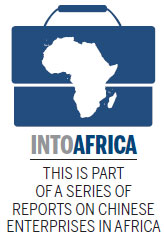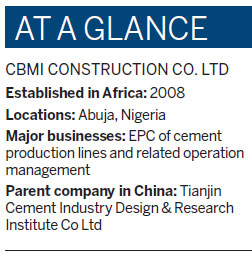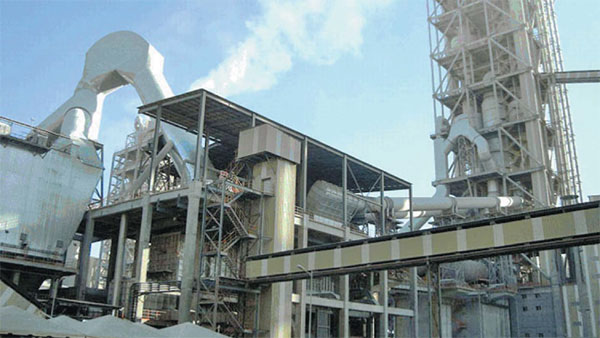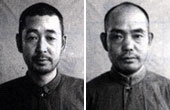Cementing a solid future in Nigeria and beyond
By Li Lianxing (China Daily Africa) Updated: 2014-07-18 09:44
|
CBMI is expanding its business in Africa through its joint venture, which gives it advantages over its competitors. Provided to China Daily |
Chinese company plans further expansion after series of new collaborations
The rapid increase in infrastructure projects across Nigeria has put the country's heavy equipment and cement supplies under strain.
But a Chinese company has agreed a series of new collaborations with international and local partners, which it says should help ease the pressure.
Ren Zhigang, the branch manager of CBMI Construction Co Ltd in Abuja, says it now has three projects under construction, in the states of Ogun, Sokoto and Ido.
Total cement production capacity from the three is expected to be in excess of 11,250 tons a day.
"Due to this large demand, our business is expected to grow at a faster pace in the very near future," Ren says.
"The contractor on the Sokoto project is BUA Group, one of Nigeria's largest commercial groups, and the expected capacity is 5,000 tons a day," he says.
"In Ogun, in a deal worth $270 million including both equipment supply and on-site construction and installment, the production line should produce 6,250 tons cement a day when completed, which would even exceed the average production capacity of 5,000 tons a day at plants in China," he says.

The Ogun deal is a refurbishment project financed by a local bank and the French industrial giant Lafarge.
The old factory's maximum output was just 2,000 tons a day, hampered mainly by inefficient equipment and management skills, Ren says, who also revealed the facility has the capacity to increase to 10,000 tons a day.
CBMI is a subsidiary of Sinoma International Engineering Co Ltd, a listed company within the China National Materials Group Corporation.
CBMI is an affiliate of Tianjin Cement Industry Design & Research Institute Co Ltd, considered one of China's top three cement research institutes.
CBMI's product quality, environmental management and occupational health and safety have all been certified with leading industry standards ISO9000, ISO14000 and OHSAS18001.
Over the past half century CBMI has been responsible for installing more than 150 cement production lines in Europe, Asia and Africa, as both a sole contractor and as a joint-venture partner.
The average capacity of its lines has been more than 4,000 tons a day.
The company is currently involved in seven African countries, and the extent of its global operations now positions it in the world's top 10 cement producers, alongside Lafarge, Holcim of Switzerland, Heidelberg of Germany and Italcementi of Italy.
Lafarge is now considered one of the Chinese company's main global strategic partners, and both have collaborated on many projects across the world.
In 2010 they completed another 5,000 ton a day plant in Ogun state.
"We were the engineering, procurement and construction contractor and built that factory according to Lafarge's requirement.
"When I went back to the project this year, I was so surprised by the business, and to see how many huge vehicles were waiting outside the factory for cement even though it had no stock," he says.
World production has now hit three billion tons a year, almost half of which comes from China. The same share comes from Chinese-built production plants around the globe.
Over the past decade Nigeria has turned itself from a cement importer into a self-sufficient producer.
In 2004, the country's cement demand was about 10 million tons a year, while it could only produce 3 million tons. Today its annual production has surpassed 28 million tons and its capacity is still growing to cope with increased demand.
A large share of CBMI's business is completed through joint ventures, and as a result its expansion in Africa has been easier than for most other foreign companies, Ren says.
"The most difficult part for us is often negotiating and finalizing details with our partners, on who provides design, evaluation, planning and construction, for instance," Ren says.
To help establish its role in the process, CBMI incorporated the Tianjin Cement Industry Design and Research Institute into its organization in 2012, to strengthen its research capability.
"Added to our existing construction and installment capacity, that mix of skills is now one of the best in the industry," Ren says.
"It allows us to provide our clients with a more complete design and construction offering."

As well as that broader range of services, Ren says, CBMI also prices itself competitively, and can produce much of its own equipment back in China.
"In many cases contractors use only major parts, like grinding machines, from Europe with the rest being built and imported from China," Ren says.
"That gives us the opportunity to showcase the quality of our machines and equipment, all of which have reached German standards, for instance, on emissions, a major requirement on many contracts in Africa."
In 2005, CBMI joined the United Nations' Global Compact initiative, which encourages businesses worldwide to adopt sustainable and socially responsible policies, and to report on their implementation.
"As a result, one of our focuses is now to build environmentally friendly factories in every corner of the world," he adds.
CBMI normally provides a one-year after-sales service on all its completed projects, which covers spare parts on machinery and operational management guidance.
"A few years ago, one of our Saudi Arabian clients organized for its employees to go to China for training, which greatly strengthened its factory's operation capacity," Ren says. "But so far no African contractors have wanted to do this."
CBMI sees Nigeria, Africa's biggest economy, as a great place to grow its business, and that could include many more local jobs as it expands its scope of work, he adds.
"Previously we would finish our project after the construction and installment, and then provide that one-year after-sales service.
"But now we are working on the feasibility of moving into permanent operational management, which makes sense as we, as the manufacturer of the equipment, are the best qualified to know how to maximize its productivity."
However, he ruled out any further moves into mine operation or actual cement sales.
Although the African cement industry is seen as having a promising future, Ren says he still regards it as carrying some risk, mainly because of security concerns.
With such a solid base in Nigeria, the company is now considering further growth across sub-Saharan Africa in the near future," he says.
lilianxing@chinadaily.com.cn
(China Daily Africa Weekly 07/18/2014 page22)











